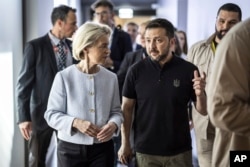Scores of participants attending a two-day international summit on peace in Ukraine in Switzerland, signed a document saying that Ukraine’s “territorial integrity” should be the basis for a peace agreement with Russia and that Kyiv should enter dialogue with Moscow on ending the war.
Russia was not invited to attend the summit at the Buergenstock resort in Switzerland dimming hopes for setting a path to peace. China, Russia’s key ally, did not attend the conference and Brazil, participated only as an observer.
The meeting aimed at shining a light to the war in Ukraine at a time when the crisis in Gaza, national elections and other concerns are competing for the world’s attention.
About 100 delegations, mostly Western countries but also some key developing nations, attended the conference.
India, Saudi Arabia and the United Arab Emirates were among those that did not sign onto the final document outlining issues of nuclear safety, food security and the exchange of prisoners.
These three topics featured prominently in the conference’s final document.
Italian Prime Minister Giorgia Meloni called these “minimum conditions” for negotiations with Russia, implying that many other areas of disagreement between Kyiv and Moscow will be harder to overcome.
The declaration also urged the return of deported Ukrainian children to their families.
Qatar’s prime minister, Sheikh Mohammed bin Abdulrahman Al Thani, said at the meeting that his country hosted talks with both Ukrainian and Russian delegations on the reunification of Ukrainian children with their families that has so far resulted in 34 children being reunited, but there is much more to be done.
White House national security adviser Jake Sullivan, speaking to reporters at the resort on Saturday, said it’s “going to take work” and countries stepping up to follow Qatar’s example.
“…not just from only voices from the United States or Europe, but from unusual voices as well to say what Russia has done here is more than reprehensible and must be reversed,” he said.
The Ukrainian government believes that 19,546 children have been deported or forcibly displaced, and Russian Children’s Rights Commissioner Maria Lvova-Belova has previously confirmed that at least 2,000 were taken from Ukrainian orphanages.
Regarding food security, the discussions focused on how Ukraine’s destruction of fertile land as well as ongoing risks posed by landmines there, have caused a slump in Ukraine’s agricultural production and exports leading to a crisis on food exports across the world as Ukraine was part of the world’s breadbasket before the war.
Artillery attacks on ships in the Black Sea have also driven up the cost of maritime transport.
The meeting’s nuclear safety session looked at the precarious situation regarding the safety and security of Ukraine’s nuclear power plants, notably Zaporizhzhia, where all the reactors have been shut down since mid-April.
European Commission Chief Ursula von der Leyen cautioned Sunday that though the summit has brought peace closer to Ukraine, real peace will not be achieved in one step, and the path there will require patience and determination. “It will be a journey,” she said after the talks.
Viola Amherd, the Swiss president who hosted the event, told the final news conference the “great majority” of participants agreed to the summit’s final document, calling for respect of Ukraine’s territorial integrity which she said, “shows what diplomacy can achieve.”
Amherd also said, “a lasting peace solution must involve both parties,” and acknowledged that “the road ahead is long and challenging.”
Ukrainian President Volodymyr Zelenskyy hailed the “first steps toward peace” at the meeting, and said the summit paved the path for a second meeting on Ukraine’s quest of a just peace.
Zelenskyy did not say whether he was prepared to engage with Russian President Vladimir Putin directly in talks to end the conflict, though he has in the past ruled out direct talks with him.
“Russia can start the negotiations with us tomorrow, not waiting for anything, if they pull out from our legal territories,” Zelenskyy told a news conference at the end of the diplomatic summit in Switzerland.
“Russia does not want peace, that is a fact,” Zelenskyy added. “Russia and their leadership are not ready for a just peace, that’s a fact,” he said.
The Kremlin said Sunday that Ukraine should “reflect” on Putin’s demands that Ukraine drops its bid to join NATO and gives up the four provinces Russia now claims: Donetsk, Luhansk, Zaporizhzhia and Kherson.
“The current dynamic of the situation at the front shows us clearly that it’s continuing to worsen for the Ukrainians,” Kremlin spokesperson Dmitry Peskov said.
“It’s probable that a politician who puts the interests of his country above his own and those of his masters would reflect on such a proposal,” Peskov said.
Russia claimed Sunday its troops had captured the Zagrine village in southern Ukraine, continuing its advances on the front line.
Some information for this report was provided by Reuters, Agence France-Presse and The Associated Press.



